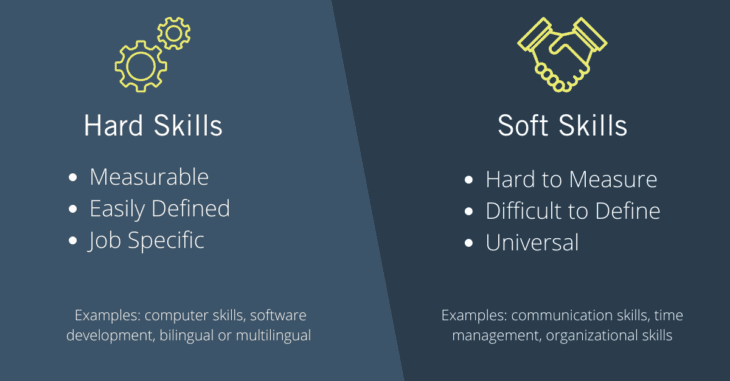
Hard skills vs soft skills: What is the difference?
In many job descriptions, employers will often look for a combination of hard and soft skills in potential candidates. Hard skills refer to technical, or knowledge-based skills while soft skills are defined as personality-based skills. The main difference between these types of skills is how they are acquired and put to use in the workplace. Hard skills are often achieved through education, licensing, certification, or specific work experience. Soft skills tend to emerge from individual characteristics or personality traits that develop throughout your life and serve a workplace function.
Because hard skills are a set of technical or educational based skills, they are acquired by way of specialized, dedicated training. This training might take place over the course of years of work experience or as you complete various levels of education. Most positions across industries will require a unique set of hard skills. Some examples of hard skills could include computer skills, software development, financial literacy, bilingual or multilingual capabilities, or campaign management. You can also see hard skills demonstrated by licenses or accreditations that a worker has earned.
Soft skills are interpersonal skills or personality traits that often relate to how you would be able to work with others in a group or workplace setting. These are skills that are important to help determine if you would fit into a company’s culture or how you would complement and build up your coworkers. Some examples of soft skills include communication skills, problem-solving abilities, time management, organizational skills, and virtues like discipline or patience. Soft skills are typically evaluated through personality-based interview questions in order to gauge how an individual would react to different situations.
Hard skills are often prioritized by employers and employees alike, but soft skills may be equally as important to a developing career. The types of hard and soft skills you highlight on your resume, cover letters, or during the interview process should vary depending on the job you are applying for. For example, if you are applying for a managerial position, it is important to convey a set of soft skills like leadership or the ability to delegate and problem solve. If you are applying for an engineering position, it would be important to show off hard skills such as accreditations, the university you attended to obtain your degree, and job-specific experience that helped enhance your knowledge in the field. You can highlight these skills by sharing specific stories from past job experiences that relate to the description and qualifications of the job that you are interviewing for.
How do you highlight these skills when applying for a new job? There are a few ways you can show off the skills that are relevant to the job you are applying for. Hard skills usually will show up in the body of your resume. Try to incorporate as many relevant skills as possible when describing your previous job experience. Soft skills can be a little trickier to incorporate into your resume. A great place is to add these are in a skills section where you can list out the traits you want to accentuate. You can also describe some of your soft skills in a cover letter. Pick a few you think are relevant to the job you are applying for and provide evidence of those skills. Finally, the best place to highlight your hard and soft skills is in an interview. This is your opportunity to sell yourself and convince a recruiter or hiring manager that your unique combination of hard and soft skills make you the perfect fit for the job!
